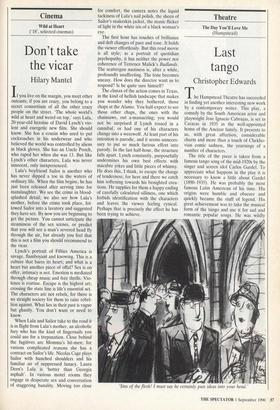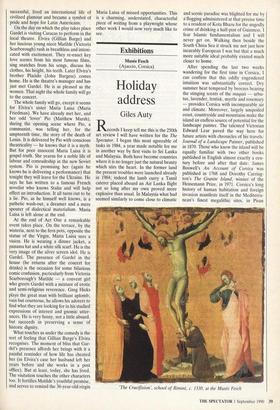Theatre
The Day You'll Love Me (Hampstead)
Last tango
Christopher Edwards
The Hampstead Theatre has succeeded in finding yet another interesting new work by a contemporary writer. This play, a comedy by the South American actor and playwright Jose Ignacio Cabrujas, is set in Caracas in 1935 in the well-appointed home of the Ancizar family. It presents to us, with great affection, considerable charm and more than a touch of Chekho- vian comic sadness, the yearnings of a number of characters.
The title of the piece is taken from a famous tango song of the mid-1920s by the singer and screen idol Carlos Gardel. To appreciate what happens in the play it is necessary to know a little about Gardel ' (1890-1935). He was probably the most famous Latin American of his time. His origins were humble and obscure and quickly became the stuff of legend. His great achievement was to take the musical form of the tango and use it for sad and romantic popular songs. Ile was wildly
'Sins of the flesh! I must say he certainly puts ideas into your head.' successful, lived an international life of civilised glamour and became a symbol of pride and hope for Latin Americans.
On the day on which the play takes place Gardel is visiting Caracas to perform in the local theatre. Elvira (Gillian Barge) and her luscious young niece Matilde (Victoria Scarborough) rush in breathless and intoxi- cated with excitement. They re-enact key love scenes from his most famous films, sing snatches from his songs, discuss his clothes, his height, his teeth. Later Elvira's brother Placido (John Burgess) comes home. He is the theatre's manager and has just met Gardel. He is as pleased as the women. That night the whole family will go to the concert.
The whole family will go, except it seems for Elvira's sister Maria Luisa (Maria Friedman). We have already met her, and her odd 'lover' Pio (Matthew Marsh), during the opening scene where Pio, a communist, was telling her, for the umpteenth time, the story of the death of Lenin. It is delivered by Pio with conscious theatricality — he knows that it is a myth. But for poor innocent Maria Luisa it is gospel truth. She yearns for a noble life of labour and comradeship in the new Soviet system. Pio is promising her (again he knows he is delivering a performance) that tonight they will leave for the Ukraine. He says he has written to a famous French novelist who knows Stalin and will help effect an introduction. It all turns out to be a lie. Pio, as he himself well knows, is a pathetic wash-out, a dreamer and a mere spouter of dialectical materialism. Maria Luisa is left alone at the end.
At the end of Act One a remarkable event takes place. On the terrace, by the wisteria, next to the fern pots, opposite the statue of the Virgin, Maria Luisa sees a vision. He is wearing a dinner jacket, a panama hat and a white silk scarf. He is the very image of the silver screen idol. He is Gardel. The presence of Gardel in the house (he returns after the concert for drinks) is the occasion for some hilarious comic confusion, particularly from Victoria Scarborough's Matilde — a convent girl who greets Gardel with a mixture of erotic and semi-religious reverence. Greg Hicks plays the great man with brilliant aplomb; vain but courteous, he allows his adorers to find what they are looking for in his studied expressions of interest and gnomic utter- ances. He is very funny, not a little absurd, but succeeds in preserving a sense of historic dignity.
What touches us under the comedy is the sort of feeling that Gillian Barge's Elvira recognises. The moment of bliss that Gar- del's presence affords her brings with it a painful reminder of how life has cheated her (in Elvira's case her husband left her years before and she works in a post office). But at least, today, she has lived. The visitation touches the other characters too. It fortifies Matilde's youthful promise, and serves to remind the 36-year-old.virgin Maria Luisa of missed opportunities. This is a charming, understated, characterful piece of writing from a playwright whose other work I would now very much like to see.



















































 Previous page
Previous page